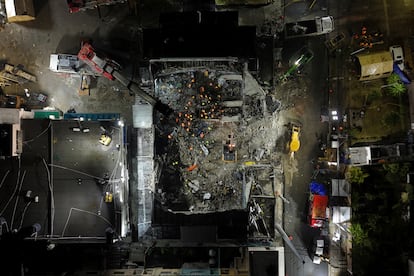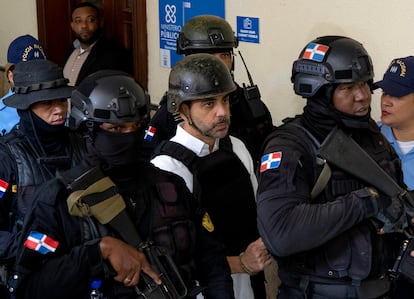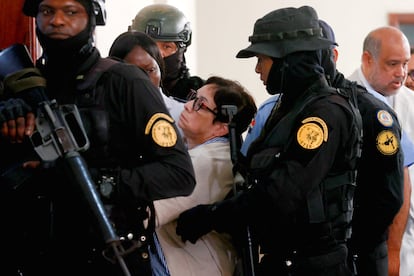Timeline of the Jet Set collapse: The ‘systematic and gross negligence’ that killed 235 Dominicans
A damning report by the Attorney General’s Office has exposed the venue’s poor maintenance. A judge will decide on Wednesday whether the nightclub owners will remain in pretrial detention

“Sir: There’s an important issue that needs to be checked at the nightclub. The ceiling panels are breaking; a piece of the ceiling is falling off, and it’s dangerous. It’d be good to take a look at the whole roof whenever there’s a chance.” This was the message that G.A., one of the workers at the Dominican nightclub Jet Set, sent to its owner, Antonio Espaillat, on April 7 at 2:23 p.m.
Eight hours later, the club opened its doors to hundreds of Rubby Pérez fans for one of its famous “dance Mondays.” At 11:40 p.m., with the party in full swing and in front of the club’s co-owner, Maribel Espaillat, a sound was heard — an object hitting the false ceiling. G.A. recognized it as “a piece of the roof” that even injured one of the attendees. Maribel denied the employee’s request to cancel the event, according to the Attorney General’s Office. An hour later, the Dominican Republic witnessed one of the most horrifying tragedies in living memory.
More than 70 days have passed since the roof of the country’s most iconic nightclub collapsed onto the bodies of hundreds of people. Two hundred and thirty-five of them died, and at least 180 were rescued with injuries and trauma that still linger.
The initial shock of that fateful April 8 has gradually turned to indignation and a quest for justice by hundreds of families still asking whether the tragedy could have been prevented. The Attorney General’s Office increasingly believes the answer is yes — and that those at least partially responsible are the owners, Antonio and Maribel Espaillat, who were arrested last Thursday on charges of involuntary manslaughter, which carries a sentence of between three months and two years in prison.
A hearing this Wednesday will determine whether they will remain in pretrial detention until a future verdict. The plaintiffs are asking for the charges to be reclassified as homicide, which would carry a sentence of 10 to 20 years.

Although the attorney for the Espaillats, Miguel Valerio, told local media that his clients are fully capable of “facing the process in freedom,” the harsh report from the Attorney General’s Office will request house arrest for Maribel Espaillat and 18 months of preventive detention for Antonio Espaillat. This is because it has emerged that Antonio Espaillat allegedly blackmailed and bribed his workers to prevent them from testifying against him.
Additionally, the Attorney General’s Office fears that the weight of G.A.’s statements — who has already reported receiving threatening messages — could lead the accused to obstruct or destroy further evidence, according to arguments from the Attorney General’s Office and the plaintiff’s legal team.
Main witness requests protection
In the lengthy and severe report, which was leaked to the press this week, prosecutors claim that for years Jet Set “operated with systematic and gross negligence in the maintenance and structural adaptation of its facilities, putting the lives of its clients and employees at risk.” The main witness has requested state protection, fearing he might turn up dead “and it might look like an accident.” According to sources close to the case, protection has not yet been granted.
The first instance of negligence, cited by the Attorney General’s Office in the more than 120-page report, dates back 30 years. In 1994, the establishment was a cinema that should have undergone proper structural modifications for its new purpose, but “the fundamental changes to the structure were not made.”
Over the years, the nightclub received multiple complaints for noise pollution and underwent renovations on several occasions, including a key project in 2014 that is central to the case, and another after a fire in 2023. In 2014, engineer José Manuel Hernández Coste was contacted by the company to carry out works that were only 10% completed.
Had the job been completed, the Attorney General’s Office argues, “the serious structural failure could have been detected, as it involved analyzing the rebar, beams, columns, slabs, and the roof.” “But that was not possible due to the lack of follow-up and interest on the part of the defendants, who displayed great irresponsibility,” the report continues, “with regard to the safety of their clients.”
The report also notes how the removal of a structural column — for aesthetic reasons and without professional evaluation — “significantly” affected the stability of the roof. These modifications were carried out “in total disregard for regulations,” it adds.
The head of the Attorney General Office’s Special Prosecution Unit, Wilson Camacho, argued that what happened at Jet Set was the result of “negligent, irresponsible decisions and behavior that demonstrates an absolute disregard for human life.”
‘The state also failed completely’
Salvador Catrain, legal representative for 11 of the more than 100 lawsuits filed, laments the “lack of consistency” from the Attorney General’s Office. He highlights the difference between this critical report and the classification of the crime as involuntary manslaughter (carrying a sentence of three months to two years) instead of murder (with a sentence of 10 to 20 years).
“We believe there was eventual intent [a form of culpability in which, although there was no intention to cause harm, it is foreseen that an action could cause it, and the person proceeds anyway]. They knew what the eventual consequences of holding the party that day would be,” says Catrain. “They must be tried for homicide, including her [Maribel]. She is just as guilty as he is.”
The report also included messages from Maribel Espaillat to one of the regular workers urging him to check the ceilings, “expressing her fear that it might harm someone present.”

“He was the head of the company, and she was his right-hand aide. They are both equally guilty. The two of them and the state,” says Catrain. “It’s a shared responsibility; because the state and the city both failed in their obligation to supervise this type of establishment, which had a capacity of up to 2,000 people. The state also failed completely.”
The report also refers to expert assessments carried out days after the victims were rescued, which initially concluded that the collapse was caused by the roof’s excess weight. From 2011 until the collapse, the roof of Jet Set Club saw a “constant and progressive” increase in the number of elements placed on top of the building — rising from seven visible items in 2011, such as mechanical equipment or technical units, to 17 elements two months ago, including technical cabins, ducts, water tanks, and six air conditioning units, each weighing between 15 and 20 tons.
Most of these elements were installed on the roof by venue employees without the technical expertise for projects of this scale, as Espaillat himself acknowledged in the only interview he gave after the collapse. In the conversation with Dominican journalist Edith Febles, he denied having added “additional weight” to the roof over time, a claim already disproven by evidence from the Attorney General’s Office.
As for the water and sand leaks, the report astonishingly reveals that “incredibly, a tarp was placed between the roof and the ceilings to contain the water that leaked from above and thus prevent it from falling directly onto the ceilings and then seeping into the building.” This tarp, they explain, was periodically removed to drain the accumulated water—something that was done just days before the tragedy. That is why the state authority concludes that this chain of actions and omissions by the accused “demonstrates a systematic pattern of irresponsibility and negligence that caused 235 deaths and more than 180 injuries.”
For the victims who turned to Catrain’s law firm, the forcefulness of the report from the Attorney General’s Office offers a small glimmer of hope amid grief and frustration. They hope, as explained by Franklyn Suero—representative of the Haineros Dorados senior group, who lost 11 members that night — that the state will deliver justice and not fail them again.
Sign up for our weekly newsletter to get more English-language news coverage from EL PAÍS USA Edition
Tu suscripción se está usando en otro dispositivo
¿Quieres añadir otro usuario a tu suscripción?
Si continúas leyendo en este dispositivo, no se podrá leer en el otro.
FlechaTu suscripción se está usando en otro dispositivo y solo puedes acceder a EL PAÍS desde un dispositivo a la vez.
Si quieres compartir tu cuenta, cambia tu suscripción a la modalidad Premium, así podrás añadir otro usuario. Cada uno accederá con su propia cuenta de email, lo que os permitirá personalizar vuestra experiencia en EL PAÍS.
¿Tienes una suscripción de empresa? Accede aquí para contratar más cuentas.
En el caso de no saber quién está usando tu cuenta, te recomendamos cambiar tu contraseña aquí.
Si decides continuar compartiendo tu cuenta, este mensaje se mostrará en tu dispositivo y en el de la otra persona que está usando tu cuenta de forma indefinida, afectando a tu experiencia de lectura. Puedes consultar aquí los términos y condiciones de la suscripción digital.









































